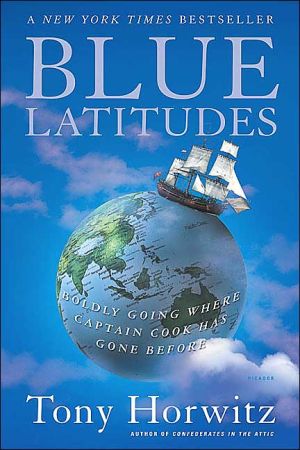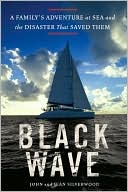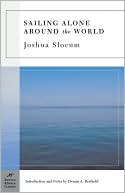Blue Latitudes: Boldly Going Where Captain Cook Has Gone Before
Boldly Going Where Captain Cook Has Gone Before\ Two centuries after James Cook's epic voyages of discovery, Tony Horwitz takes readers on a wild ride across hemispheres and centuries to recapture the Captain’s adventures and explore his embattled legacy in today’s Pacific. Horwitz, a Pulitzer Prize-winner and author of Confederates in the Attic, works as a sailor aboard a replica of Cook’s ship, meets island kings and beauty queens, and carouses the South Seas with a hilarious and...
Search in google:
In an exhilarating tale of historic adventure, the Pulitzer Prize-winning author of Confederates in the Attic retraces the voyages of Captain James Cook, the Yorkshire farm boy who drew the map of the modern worldCaptain James Cook's three epic journeys in the 18th century were the last great voyages of discovery. His ships sailed 150,000 miles, from the Artic to the Antarctic, from Tasmania to Oregon, from Easter Island to Siberia. When Cook set off for the Pacific in 1768, a third of the globe remained blank. By the time he died in Hawaii in 1779, the map of the world was substantially complete. Tony Horwitz vividly recounts Cook's voyages and the exotic scenes the captain encountered: tropical orgies, taboo rituals, cannibal feasts, human sacrifice. He also relives Cook's adventures by following in the captain's wake to places such as Tahiti, Savage Island, and the Great Barrier Reef to discover Cook's embattled legacy in the present day. Signing on as a working crewman aboard a replica of Cook's vessel, Horwitz experiences the thrill and terror of sailing a tall ship. He also explores Cook the man: an impoverished farmboy who broke through the barriers of his class and time to become the greatest navigator in British history. By turns harrowing and hilarious, insightful and entertaining, BLUE LATITUDES brings to life a man whose voyages helped create the 'global village' we know today. Thomas Jackson - Forbes Imagine you're an editor at a book publishing firm, and a writer comes to you with the idea of traveling to Seat-tle, Tahiti, Bora Bora, New Zealand, Australia, Tonga, England, Alaska and Hawaii in search of Captain Cook, the ex-plorer who charted and helped to "discover" about a third of the planet a little over 200 years ago. He wouldn't be able to say who he was going to interview at any given place, because for the most part, he wouldn't know yet. Instead, he would take things as they came, asking strangers if they knew about Cook, and if so, what they thought of him. He'd follow one lead to another, do a lot of reading, attend some Cook-related festivities, visit some monuments and write a funny, thought-provoking travelogue cum biography of the great explorer.I'd say no. It's a sad day for the guy who embarks on such a vague, unruly quest. It's like renting a Zil in St. Pe-tersburg and setting out to "find" Russia. But somebody at Henry Holt and Company said yes to Pulitzer-winning war correspondent Tony Horwitz and by golly, they were right to do so. Who better to search for the legacy of Captain Cook than the reporter who wrote an acclaimed book about the Civil War, Confederates in the Attic, by schlepping around the South for a year interviewing reenactors? With prodigious research and a willingness to raise the subject of Captain Cook with anyone, including a drunk, a king and a girl in a wet T-shirt, Horwitz has managed to muscle a big, sloppy idea into something coherent and fun to read.Granted, it takes him 450 pages.He starts his journey with some frontline experience, pressing himself into service on the Endeavour, a working replica of the beamy,flat-bottomed ship Cook sailed on the first of his three voyages. Sea travel 18th-century style turns out to be as grueling and degrading as one would expect. The spaces are cramped, the officers are mean bas-tards and the work is backbreaking. Horwitz only crews for a week, which hardly compares to an eight-month passage from Plymouth to Tahiti, but he paints a vivid picture of life on that wobbly tub, plying along for months at a time with-out sight of land or a bite of fruit.That trial endured, Horwitz heads to Australia, his base of operations for hopping to points Cook-related all over the Pacific. In alternating passages, he describes the wonders Cook found on various virgin shores, then reports on the state of each place today. One shudders to imagine the original Endeavour's arrival at Tahiti in 1769, when Cook's sex-starved, syphilitic sailors were loosed on that verdant island's girls, who were pretty, generally naked and willing to trade their favors for a nail. (Cook had a serious nail theft problem.) Hospitality doesn't come so cheap in Ta-hiti today--a rental car goes for about $100 a day and the bikini babes are standoffish. But even though the Tahiti of the 18th century is long gone, overrun by sailors, missionaries, French colonialists and tourists, Horwitz manages to find traces of the place Cook described in his journal. He sees the island's libertinism, so so shocking to the captain, on rau-cous display at a transvestite club, and he meets a group of teenagers who are as laid-back and starry-eyed as the Tahi-tians Cook met 200 years ago.Whenever he can, Horwitz tries to create a Cook-like sense of discovery. He prepares for his visit to an island nation called Niue, a tiny speck between Tahiti and Tonga, by not learning anything about it. All he knows is that when Cook arrived there in 1774, he was confronted by an angry group of men whose mouths were stained a bloody shade of red, which compelled the captain to dub the place "Savage Island" before blowing out on the next gust.Brief as that encounter was, Horwitz discovers, Niue's inhabitants are still trying to erase the spot it put on their reputation, particularly the widespread assumption that the red stuff was human blood. Was it, as the natives today con-tend, the smeared flesh of a local species of red banana? If so, why can't anyone show Horwitz a red banana tree? Pre-sented with a quirky little conflict like this, Horwitz is in his element. He dashes around the island asking about ba-nanas, and discovers all sorts of other secrets along the way. Niue is an offshore tax haven--just $385 a year to register a company--and despite the religiosity of its inhabitants, a major hub for telephone sex chat lines. It even has what ap-pears to be a sham medical school. To watch Horwitz, the star reporter, unravel that island like a ball of twine is pure pleasure. The Niuens are glad to see him leave.As for his spot surveying, Horwitz finds that Captain Cook is many different things to many different people. To the Hawaiians who chopped him up and barbecued him in 1779, he was a god, and to many history buffs he still is. Yet in New Zealand, the native Maori see him as a villain, as do most natives of the places he visited. In Australia, Horwitz says Cook is being written out of history as an act of atonement to the wronged aborigines. The girl in the wet T-shirt has but a tentative grip on his character. "He'd think I was a complete lunatic," she says. Strangely enough, the man who still elicits such passion was remarkably rational and coolheaded himself, temper tantrums notwithstanding. If anything, Horwitz reveals the most about Cook by acting like Cook, exploring each place with the same energy and relentless curiosity as the man himself. A lesser writer would have gotten lost out there in the big blue, then chopped up and barbecued by book reviewers. Not Horwitz. He has one-upped Cook and made it home in one piece.
From Blue Latitudes:\ I studied the application for a berth on His Majesty's Bark Endeavour. An Australian foundation had built a replica of Cook's first vessel and dispatched it around the globe in the navigator's path. At each port, the ship's professional crew took on volunteers to help sail the next leg and experience life as eighteenth-century sailors. This seemed the obvious place to start; if I was going to understand Cook's travels, I first had to understand how he traveled.\ The application asked about my "qualifications and experience."\ "Have you had any blue water ocean sailing experience?"\ "Can you swim 50 meters fully clothed?"\ "You will be required to work aloft, sometimes at night in heavy weather. Are you confident of being able to do this?"\ I wasn't sure what was meant by "blue water ocean." Did it come in other colors? I'd never swum clothed; as for working aloft, I'd climbed ladders to scoop leaves from my gutter. I checked "yes" next to each question.\ But the last query gave me pause. "Do you suffer from sea sickness?"\ Only when I went to sea.
\ From Barnes & NobleThe Barnes & Noble Review\ Tony Horwitz (Baghdad Without a Map, One for the Road, Confederates in the Attic) is an unrivaled practitioner of how-it-should-be-done exploration and adventure writing, and his stirring chronicle of voyaging and visiting along Captain James Cook's pioneering routes will fire up landlocked readers. Cook's three voyages of the 1770s were the greatest and most challenging attempts ever undertaken to discover and map the nondum cognita (not yet known) world: the imagined Great Southern Continent, the Pacific archipelagos, and (almost an afterthought) the Northeast Passage. \ Horwitz provides a rousing tale of modern-day exploration as he and his volunteer shipmates endure the rigors and hardships of the voyage on a replica of Cook's ship, calling to mind the best that adventure literature has to offer. But he does much more. With keen insight, he examines the profound impact of Cook's appearance -- unavoidably, as an advance man for British imperial and commercial interests -- on the native peoples of New Zealand, Australia, and other homelands. Along the way he provides an engrossing consideration of intrusion and memory; of change and loss of identity; of displacement and the problems of adaptation. The indigenous social and economic entities of Cook's day are long gone; Horwitz examines the degree to which the successor arrangements -- so often dominated by the United States or European powers -- have proved to be both destructive and unrewarding. He lets the locals speak, and they have much to say that's painful to hear. This book is a winner, and the excellent source notes open a welcome door to the always engaging Cook literature. Peter Skinner\ \ \ \ \ \ From the Publisher"Thoroughly enjoyable. No writer has better captured the heroic enigma that was Captain James Cook than Tony Horwitz in this amiable and enthralling excursion around the Pacific." —Bill Bryson, author of In a Sunburned Country\ "Tony Horwitz's Blue Latitudes is one of the best. . . full of humor. . . an elegant running account of Cook's exploits."—The New York Times Book Review (cover review)\ "Part history, part travelogue—and mostly just great fun. . . This is history on a global scale, and Horwitz tells it surpassingly well."—Los Angeles Times\ "A tour de force of evocative history, serious scholarship, and compelling writing."—The Washington Post\ "Part Cook biography, part travelogue, and very much a stroke of genius." —The Philadelphia Inquirer\ "Hilarious, brainy, and balanced. . . .A trip with Horwitz is as good as it gets."—The Charlotte Observer\ "Tony Horwitz has done it again. . . Keen insight, open-mindedness and laugh-out-loud humor."—San Francisco Chronicle\ "A staggering blend of historical research, character study, sociological analysis, and intriguing tales of travel." —The Boston Globe\ "Curiosity, intelligence, compassion and a sense of adventure. . . I love reading Tony Horwitz."—Chicago Tribune\ "Horwitz succeeds brilliantly in turning the English from stiff icons to flesh-and-blood human beings. The book's constant humor, honesty and judgment recall his own Confederates in the Attic and Bill Bryson’s A Walk in the Woods.. . . This book will keep you enthralled."—The Seattle Time\ \ \ \ ForbesImagine you're an editor at a book publishing firm, and a writer comes to you with the idea of traveling to Seat-tle, Tahiti, Bora Bora, New Zealand, Australia, Tonga, England, Alaska and Hawaii in search of Captain Cook, the ex-plorer who charted and helped to "discover" about a third of the planet a little over 200 years ago. He wouldn't be able to say who he was going to interview at any given place, because for the most part, he wouldn't know yet. Instead, he would take things as they came, asking strangers if they knew about Cook, and if so, what they thought of him. He'd follow one lead to another, do a lot of reading, attend some Cook-related festivities, visit some monuments and write a funny, thought-provoking travelogue cum biography of the great explorer.\ I'd say no. It's a sad day for the guy who embarks on such a vague, unruly quest. It's like renting a Zil in St. Pe-tersburg and setting out to "find" Russia. But somebody at Henry Holt and Company said yes to Pulitzer-winning war correspondent Tony Horwitz and by golly, they were right to do so. Who better to search for the legacy of Captain Cook than the reporter who wrote an acclaimed book about the Civil War, Confederates in the Attic, by schlepping around the South for a year interviewing reenactors? With prodigious research and a willingness to raise the subject of Captain Cook with anyone, including a drunk, a king and a girl in a wet T-shirt, Horwitz has managed to muscle a big, sloppy idea into something coherent and fun to read.\ Granted, it takes him 450 pages.\ He starts his journey with some frontline experience, pressing himself into service on the Endeavour, a working replica of the beamy,flat-bottomed ship Cook sailed on the first of his three voyages. Sea travel 18th-century style turns out to be as grueling and degrading as one would expect. The spaces are cramped, the officers are mean bas-tards and the work is backbreaking. Horwitz only crews for a week, which hardly compares to an eight-month passage from Plymouth to Tahiti, but he paints a vivid picture of life on that wobbly tub, plying along for months at a time with-out sight of land or a bite of fruit.\ That trial endured, Horwitz heads to Australia, his base of operations for hopping to points Cook-related all over the Pacific. In alternating passages, he describes the wonders Cook found on various virgin shores, then reports on the state of each place today. One shudders to imagine the original Endeavour's arrival at Tahiti in 1769, when Cook's sex-starved, syphilitic sailors were loosed on that verdant island's girls, who were pretty, generally naked and willing to trade their favors for a nail. (Cook had a serious nail theft problem.) Hospitality doesn't come so cheap in Ta-hiti today--a rental car goes for about $100 a day and the bikini babes are standoffish. But even though the Tahiti of the 18th century is long gone, overrun by sailors, missionaries, French colonialists and tourists, Horwitz manages to find traces of the place Cook described in his journal. He sees the island's libertinism, so so shocking to the captain, on rau-cous display at a transvestite club, and he meets a group of teenagers who are as laid-back and starry-eyed as the Tahi-tians Cook met 200 years ago.\ Whenever he can, Horwitz tries to create a Cook-like sense of discovery. He prepares for his visit to an island nation called Niue, a tiny speck between Tahiti and Tonga, by not learning anything about it. All he knows is that when Cook arrived there in 1774, he was confronted by an angry group of men whose mouths were stained a bloody shade of red, which compelled the captain to dub the place "Savage Island" before blowing out on the next gust.\ Brief as that encounter was, Horwitz discovers, Niue's inhabitants are still trying to erase the spot it put on their reputation, particularly the widespread assumption that the red stuff was human blood. Was it, as the natives today con-tend, the smeared flesh of a local species of red banana? If so, why can't anyone show Horwitz a red banana tree? Pre-sented with a quirky little conflict like this, Horwitz is in his element. He dashes around the island asking about ba-nanas, and discovers all sorts of other secrets along the way. Niue is an offshore tax haven--just $385 a year to register a company--and despite the religiosity of its inhabitants, a major hub for telephone sex chat lines. It even has what ap-pears to be a sham medical school. To watch Horwitz, the star reporter, unravel that island like a ball of twine is pure pleasure. The Niuens are glad to see him leave.\ As for his spot surveying, Horwitz finds that Captain Cook is many different things to many different people. To the Hawaiians who chopped him up and barbecued him in 1779, he was a god, and to many history buffs he still is. Yet in New Zealand, the native Maori see him as a villain, as do most natives of the places he visited. In Australia, Horwitz says Cook is being written out of history as an act of atonement to the wronged aborigines. The girl in the wet T-shirt has but a tentative grip on his character. "He'd think I was a complete lunatic," she says. Strangely enough, the man who still elicits such passion was remarkably rational and coolheaded himself, temper tantrums notwithstanding. If anything, Horwitz reveals the most about Cook by acting like Cook, exploring each place with the same energy and relentless curiosity as the man himself. A lesser writer would have gotten lost out there in the big blue, then chopped up and barbecued by book reviewers. Not Horwitz. He has one-upped Cook and made it home in one piece.\ —Thomas Jackson\ \ \ \ \ \ Bill BrysonBlue Latitudes is thoroughly enjoyable. No writer has better captured the heroic enigma that was Captain James Cook than Tony Horwitz in this amiable and enthralling excursion around the Pacific.\ \ \ \ \ Caroline AlexanderHorwitz's adventures pay illuminating tribute to the great navigator — to Captain Cook himself and to his intrepid eighteenth-century colleagues, including the improbably attractive Sir Joseph Banks. But most of all Blue Latitudes offers clear-eyed, vivid, and highly entertaining reassurance that there are still outlandish worlds to be discovered.\ \ \ \ \ Nathaniel PhilbrickBlue Latitudes is a rollicking read that is also a sneaky work of scholarship, providing new and unexpected insights into the man who out-discovered Columbus. A terrific book — I inhaled it in one weekend.\ \ \ \ \ Outside MagazineTony Horwitz has written about oddball history buffs before . . . this time he becomes one himself . . . The author sets off island-hopping across the South Pacific in the wake of Cook’s Endeavor producing some classically absurd Horwitzian scenes . . . But there are sobering moments too; Horwitz finds many islands in the grip of a fierce anticolonialism, with Cook as convenient lightning rod.\ \ \ \ \ Library JournalJournalist Horwitz, who is fascinated by James Cook and is convinced the world has underestimated his achievements, follows the explorer's three ventures into what was at that time the vast unknown. Signing on as a crew member for a Cook ship simile cruise, he experiences firsthand the life of an 18th-century sailor and becomes completely captivated with Cook's accomplishments. Subsequently, Horwitz and an Australian friend take more contemporary transportation to visit the captain's English home and the faraway places with strange sounding names that he opened to the world. The author slips easily from explaining history, Cook's personality, and life to describing his own modern-day experiences delving into Cook's past. Some details of late 1700s shipboard discipline, sexual lifestyles, and Cook's death and dismemberment are probably too grisly for most young listeners. Despite a few too many searches for and visits with the odds and ends of people (from bartenders to a king) who claim to have some affiliation with Cook, the book is interesting and educational. Daniel Gerroll is well spoken and does accents and other voices very nicely. For history and travel buffs interested in Australia, the South Pacific, and seafaring; generally recommended for adult and college collections.-Carolyn Alexander, Brigadoon Lib., Corral de Tierra, CA Copyright 2003 Reed Business Information.\ \ \ \ \ Kirkus ReviewsPulitzer-winning journalist and travel-writer Horwitz (Confederates in the Attic, 1998, etc.), dogging the wake of Captain Cook, discerningly braids Cook's long-ago perceptions with his own present-day inquiries into the lands the Captain encountered. Cook made three epic voyages, sailing from Antarctica to the Arctic, from Australia to Alaska, and to many of the islands that lie between. Fascinated by the man and his accomplishments, Horwitz visits those far-flung lands where the impact of Cook's arrival was more profound and lasting than the news of the lands' existence was upon the Europeans back home. The author travels by sailboat and ferry, often in the company of his Australian chum Roger, an odd-fellow and contrarian of rare stripe who adds a comic counterpoint to Horwitz's probings into attitudes toward Cook in the places he set anchor-attitudes that run the gamut from loathing to reverence. Natives for the most part revile him, though it's a quirk of fate that the captain's logs are now helping New Zealand's Maori establish land claims. Horwitz's portraits of the lands can be dispiriting: Bora Bora on the brink of environmental collapse, Tahiti gripped by ennui, Tonga feudal with feudal squalor and ill temper. But there are also innocent Niue and vibrant Hawaii and Australia-where Cook is sooner forgotten by all concerned. Of the navigator himself, Horwitz says that "his journals allow us to chart almost every one of his steps and sails, right down the minutest degree of latitude. But [he] left us no map to his own soul." Still, he rises from these pages as a thoughtful and humane character sensitive to the men who served him and to the local populations he met, though "mutualincomprehension over notions of property and justice [plagued him] throughout his Pacific voyages" and in fact led to his death. Tandem voyages taken 200 years apart: filled with history and alive with contrasts.\ \








